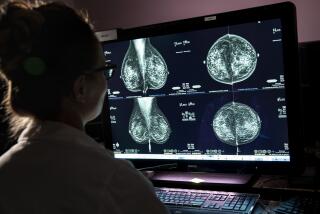EARLY warning
It’s hard to oppose cancer education. That is probably why the proposed Education and Awareness Requires Learning Young (EARLY) Act has 363 co-sponsors in the House of Representatives. The $45-million bill, which seeks “to increase public awareness regarding the threats posed by breast cancer to young women,” is well-intentioned and emotionally appealing.
It is also a big mistake.
For starters, it targets women between the ages of 15 and 39. Fewer than 5% of breast cancers occur before age 40. According to national statistics, about one in 10,000 20-year-old women will die of breast cancer in the next 10 years (meaning that 9,999 will not). For context, a 70-year-old man has about the same risk of dying from breast cancer.
In addition to making young women more aware (and undoubtedly more worried) about breast cancer, the EARLY Act proposes to teach them how to lower their chances of developing breast cancer. This presents a fundamental problem because there are no proven strategies to do this. So what would proponents say should be taught?
One idea is to have women try to focus on reducing breast cancer risk factors within their control. But as Barnett Kramer, associate director for disease prevention at the National Institutes of Health, has pointed out, the most common risk factor for breast cancer (apart from older age and being a woman) is having children at an older age. In fact, risk starts to rise if a woman has not had her first full-term pregnancy by age 20. There is also some published evidence that, at least among younger women, increased body mass is associated with a lower breast cancer risk. It is hard to believe that the EARLY Act’s sponsors would want to launch a public health campaign encouraging teens to become pregnant or gain weight.
A second idea -- specifically called for in the legislation -- is to promote breast self-examinations to achieve “early detection of breast cancer among young women.” But there is no credible scientific evidence that this would reduce breast cancer deaths. In fact, the two largest, randomized trials looking at breast self-exams found that they did not lead to fewer deaths from breast cancer. The groups doing breast exams did, however, end up having twice as many unnecessary biopsies (about 2% versus 1%).
A call for increased self-examination among young woman might also trigger more screening mammograms, and there is no evidence that mammography before age 40 reduces the risk of dying from breast cancer. Young women have dense breast tissue, which leads to more false alarms. Mammography screening also results in over-diagnosis, the detection of cancers that were never destined to cause symptoms or death even if untreated. It has been estimated that 10% to 50% of breast cancers detected by mammography screening are in fact over-diagnosis. Over-diagnosis leads to treatment that can only cause harm. And of course, early exposure to radiation can itself increase cancer risk.
Another idea raised in the EARLY Act is more targeted: encouraging young Ashkenazi Jewish women and African American women to consider genetic testing. In contrast, medical experts do not routinely suggest genetic testing based solely on race or ethnicity -- but rather on family history. If, for example, two or more close family members contracted breast cancer before age 50, that would be a reason to consider testing. The reason behind this recommendation is that the effect of genetic mutations on breast cancer risk -- in the absence of a strong family history -- is unknown, but the psychological impact of identifying the mutations may be substantial. And there can be physical consequences too. Some women will opt to have their breasts and ovaries removed to reduce risk. Other women may start having mammography or breast MRIs at a very early age.
Neither the American Cancer Society nor the National Breast Cancer Coalition support the EARLY Act, and the latter is actively opposing it. Why? Because no matter how intuitively appealing it may be to engage young women in the fight against breast cancer, the EARLY Act runs counter to the evidence. It would end up doing more harm than good.
More to Read
Sign up for Essential California
The most important California stories and recommendations in your inbox every morning.
You may occasionally receive promotional content from the Los Angeles Times.









